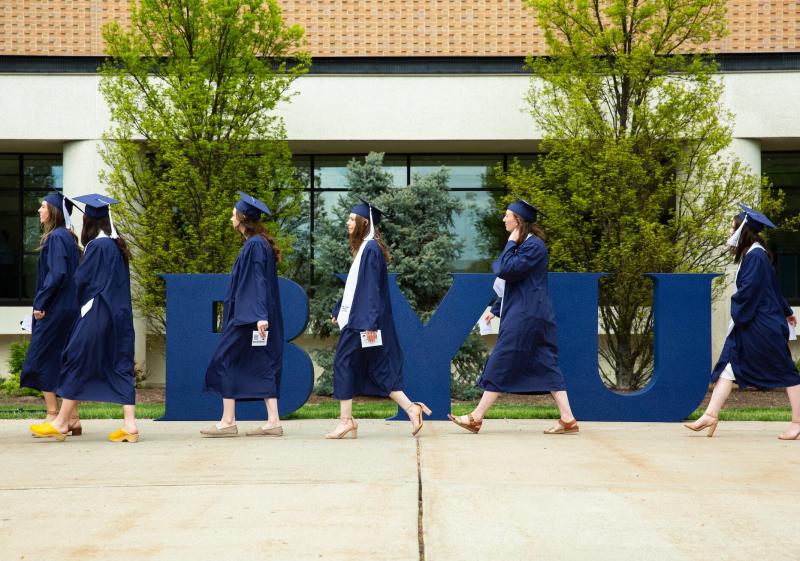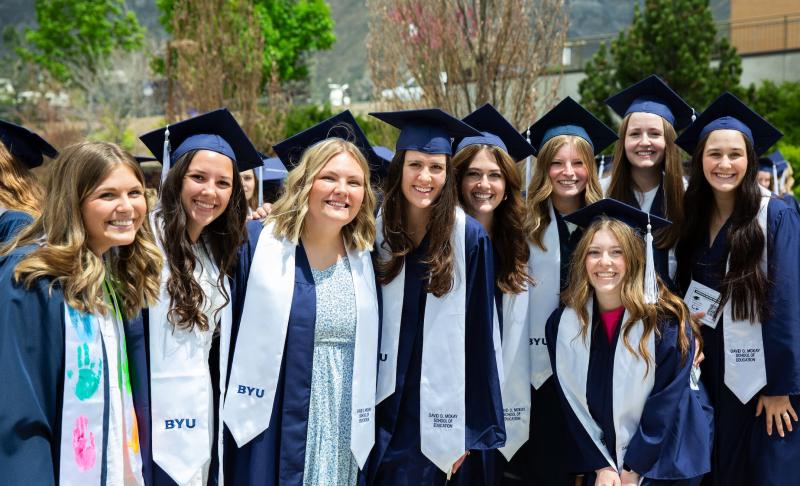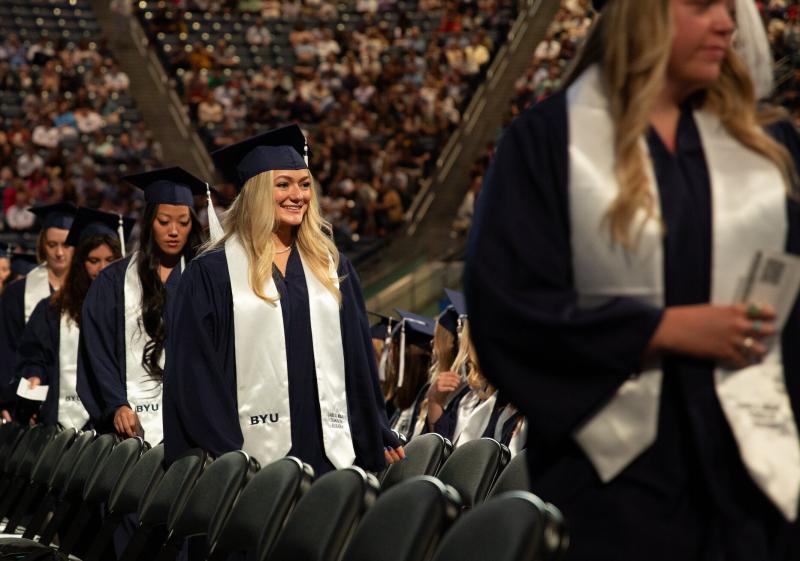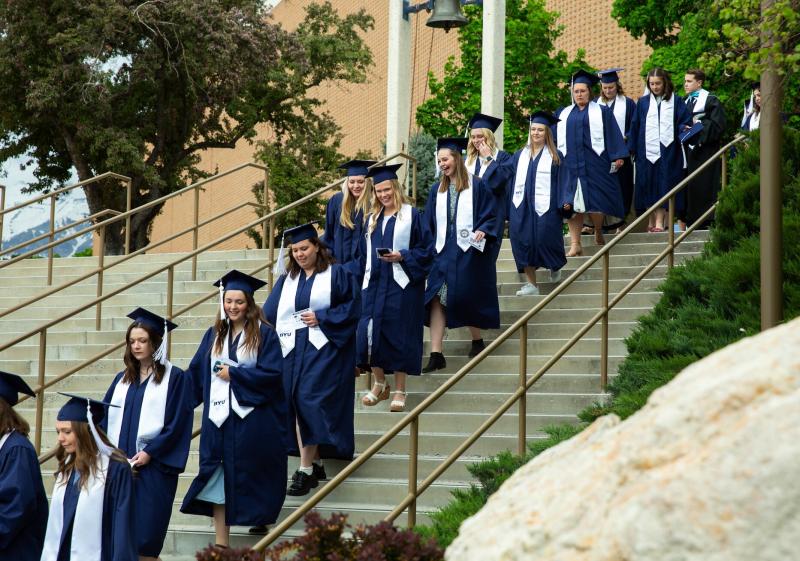
Through loss and gain, through challenge and growth, a BYU education helps graduates find the tools they need not just to succeed in life, but to find true joy and peace. That was the message graduation speakers shared with more than 500 graduates of the McKay School of Education at convocation on Thursday.
“Wherever life takes you, keep reppin’ the Y,” McKay School Dean Kendra Hall-Kenyon told graduates. “This phrase holds deeper significance in the McKay School. As educators, as clinicians, as leaders, you represent Jesus Christ. … You’ve been prepared to go out into the world to do so much good. I hope you feel that today.”
Besides the 500+ students participating in the McKay School’s convocation, Hall-Kenyon noted, 169 secondary education students participated in convocations for their content disciplines across campus on Thursday and Friday. In addition to their McKay School professors, chairs, and deans, students were congratulated by BYU President Shane Reese and Elder Matthew Holland, who both had daughters graduating in elementary education.
“There is no better group of students, no group with more potential to do good in the world, to have more significant impact, than this group of graduates right here,” Hall-Kenyon added, noting that McKay School graduates learn to combine the best professional practice with the moral outlook that accompanies a deep and loving relationship with Jesus Christ.
“I am certain the heavens are rejoicing with us today as you go forth to engage in the personal and professional work that lies ahead. You can literally change the world.”

Undergraduate speaker Katie Busch, an elementary education graduate, noted that, while at BYU, she and her fellow McKay School students have learned a lot: “We know which Instagram accounts to check for free food, where to get free BYU swag, and when the BYU parking police ticket certain lots.”
There were other lessons, as well, she said; ones that will last forever, from the nurturing and encouragement of “some of the top professors in the nation” to soaking in the spiritual focus that is found across campus.
“I am so grateful for all of the faculty, staff, and family who have helped each of us get to this stage,” Busch said. “More than the lessons in math, technology, research, or management, I am grateful for the small moments they each took to teach us of Christ and help us strengthen our testimonies. The education we received at BYU goes beyond the classroom.”
Busch said she was grateful to have gone into her educator preparation with knowledge of Jesus Christ, the ultimate example of teaching with love and with a focus on the needs of each individual person: “The more I try to emulate the Master Teacher, the better teacher and person I become.”
She read a poem she wrote about Jesus Christ, which reads in part, “The greatest teacher/I have ever had/Is not a coach/Nor just a man. … The Master teacher/Inspires us all/He guides our paths/And helps us stand tall.”
“As we try to emulate Christ, we will grow and strengthen our relationship with Him,” Busch said. “After leaving BYU, we are each headed down our own unique path. Whether our path leads to administration, a classroom, a hospital, a home, or any other place, the lessons we learn from Christ will benefit us all.”

Graduate speaker Karen Arnesen echoed those words, expressing thanks for her “walk with Christ” during her time as a graduate student in instructional psychology and technology.
Arnesen earned a BYU undergraduate degree in English literature “in the last millennium, when we still read books on paper." Decades later, she returned “as a grandma” to study IP&T as a master’s student. After earning that master’s, she and her husband, Brian, left on a mission to Argentina. “This was an incredibly joyful time,” she said. “We loved working together every day, teaching with the young missionaries, and helping struggling members in our branch.”
However, four months after they arrived, their mission was cut short due to the COVID-19 pandemic. During the pandemic, Arnesen re-enrolled at BYU to pursue a doctorate in IP&T, noting with a smile that “thankfully, my department is very good with online learning.” A year after returning from their first mission, Arnesen and her husband were reassigned to serve in Guatemala. But this mission, too, was cut short, this time by Brian’s devastating diagnosis of stage four cancer. He died four months later.
Arnesen’s life—her future plans, her social structures, the comfort she had felt in church—crumbled, she said: “My mind felt muddled. I was easily distracted and frequently forgot things. I didn’t trust my ability to think and reason. … I was not familiar with this person I had become. I didn’t know how to deal with her.”
In that time of crisis, a wise friend reminded Arnesen: “Karen, this is a surprise to you, but it is not a surprise to God. He has always known this would happen. He is not unprepared." That conversation helped Arnesen refocus her life, “to dig deeply and rely more fully on Christ, the bedrock of my foundation. … He softened my heart, calmed my fear, put me in perfect places, strengthened my dedication, and increased my confidence.”
The Savior also, she added, “gave me our covenant community at BYU,” including “wise and beloved” mentors, her graduate cohort, students she taught, and others: “One student, who served with us in Argentina, always hugged me when she saw me in the halls. Many of you have simply raised your eyes as you walked through the halls and smiled at me. I don’t know your names, but for me, your smiles live in eternity.”
As an instructor during her doctoral studies, Arnesen tried to pass on what she was learning, including a “sacred and reverent” experience in which her class, its members each facing various difficulties, decided to pray together for each other.
“I am so grateful to walk with each of you in this mortal journey, where we care for each other,” Arnesen said. “We walk with Christ. We build our foundation on Him. We rest securely in Him.”

With visible emotion, associate dean Sarah Clark assured graduates that “as faculty, staff, and administrators, we have spent these past few years thinking of and praying for each of you.”
She told the graduates of the class of 2024 that, as she reflected upon all the things they have achieved and the ways they have grown and developed, she thought of the circumstances surrounding 2 Nephi 25:26; adapting it to the past tense, it reads, “And we talked of Christ, we rejoiced in Christ, we preached of Christ, we prophesied of Christ, and we wrote according to our prophecies, that our children may know to what source they may look for a remission of their sins.”
Nephi is experiencing his own ending, and he is painting a path for the people he will leave behind,” Clark said. “I began to ponder: what had Nephi seen, heard, and felt in order to reach this life-altering understanding that following the Savior was their greatest chance for success?
“He experienced the highs of being tutored by the Lord to build a grand ship, while also being almost beaten to death by those who should have loved and cared for him. I would ask you the same question. What have you seen, heard, and felt about the Savior as a student at BYU? No doubt you, too, have also experienced the highest of highs and the lowest of lows.”
To prepare for her convocation speech, Clark said, she spoke to McKay School students about their experiences at BYU, hearing beautiful stories of seeing Christ in an autistic child’s first loving greeting to his parents, hearing Him in a prompting to slow down note-taking to be more open to spiritual promptings that boost learning, and speaking joyfully about the suffering that will be relieved as a result of this year’s new crop of fully qualified, spiritually enriched school psychologists. “It was beautiful to hear this articulated,” she said.
Clark noted that she ends the semester of each class she teaches with four words for her students: “I’m not going anywhere.”
“I’m not going anywhere. Did you know that you can decide this today?” she said. “In addition to expressing my love to Heavenly Father, I love to include these words in my personal prayers. These are some of the most powerful words I have said aloud. Whenever my students think of me and my testimony, I hope they will remember that I am committed forever to this gospel and to our Savior, Jesus Christ—no matter what!
“Graduates of the McKay School of Education, be the power, be the hope, be the voice, and be the light that this world needs. We will forever be cheering you on!”
By Stacey Kratz